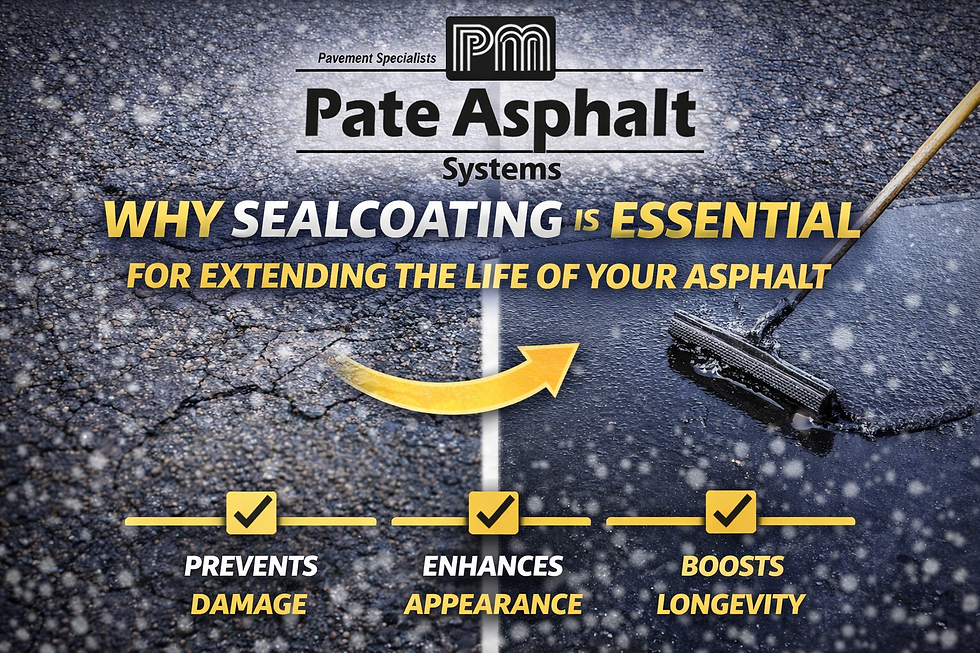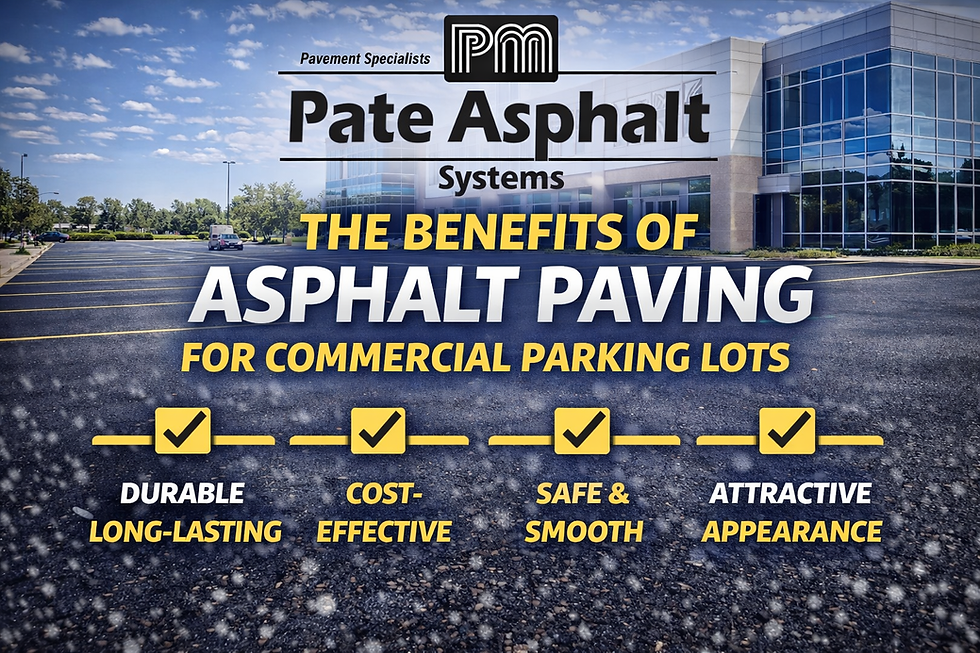The Science Behind Asphalt: Why It Performs Better in Iowa’s Freeze–Thaw Cycles
- Inspired Connection Agency
- Sep 26, 2025
- 5 min read
When you live in Iowa, you know how unpredictable the weather can be. One week it’s warm enough to enjoy a bike ride in short sleeves, and the next, the temperature drops below freezing with snow in the forecast. This constant swing between warm and cold is more than just an inconvenience—it’s one of the most challenging conditions for roads, driveways, and parking lots. Known as freeze–thaw cycles, this pattern causes the ground and pavement materials to expand and contract repeatedly, which can wreak havoc on many surfaces.
Fortunately, asphalt has proven to be one of the best paving materials for standing up to Iowa’s shifting climate. But why is that the case? The answer lies in the science behind asphalt’s material properties, its flexibility, and how it adapts to Iowa’s extreme seasonal conditions.
What Are Freeze–Thaw Cycles?
A freeze–thaw cycle occurs when water infiltrates cracks or pores in the pavement surface and then freezes as temperatures drop below 32°F. Since water expands by nearly 9% when it freezes, the pressure pushes against the pavement. When temperatures rise again, the ice melts, and the pavement contracts. Over time, this repeated expansion and contraction leads to cracks, potholes, and structural damage.
In Iowa, these cycles are particularly frequent. According to data from the Iowa Environmental Mesonet, the state averages 30 to 60 freeze–thaw events per year, depending on location. That means pavements here face more stress than in warmer or more stable climates.

Why Asphalt Excels in Iowa’s Climate
Not all paving materials are created equal. Concrete, for example, is durable but rigid. That rigidity makes it more prone to cracking under the stress of expansion and contraction. Asphalt, by contrast, has unique properties that give it a competitive advantage in places like Iowa.
1. Flexibility and Elasticity
Asphalt is known as a flexible pavement, meaning it can bend and stretch slightly without breaking. This flexibility allows asphalt to absorb the stress caused by freeze–thaw cycles rather than fracturing like more rigid materials.
2. Thermal Properties
Asphalt has a dark surface, which absorbs heat from the sun more effectively than lighter-colored surfaces. This helps it thaw faster during the winter, reducing the amount of time ice and snow sit on its surface. Faster melting means less long-term exposure to frozen water that can cause damage.
3. Permeability Control
Modern asphalt mixes can be designed with specific porosity levels. Properly engineered asphalt limits how much water can penetrate the pavement, reducing the risk of freeze–thaw damage at the base. Sealcoating further enhances this by adding a protective layer against moisture infiltration.
4. Repair and Maintenance Advantages
Even when cracks do form, asphalt is much easier and more cost-effective to repair compared to concrete. Small cracks can be sealed, and potholes can be patched, extending the lifespan of the pavement.
The Science of Asphalt Mixtures
The performance of asphalt in Iowa isn’t just luck—it’s the result of careful engineering. Asphalt is a composite material made up of aggregates (like crushed stone, gravel, and sand) bound together by asphalt cement, a petroleum product.
Mix Design Matters
Engineers adjust asphalt mixes based on climate and traffic conditions. In colder climates like Iowa, mixes are designed to remain more pliable at low temperatures, reducing the risk of thermal cracking.
Binder Grade Adjustments
The Performance Grade (PG) system is used to classify asphalt binders based on the range of temperatures they can withstand. For example, Iowa often uses PG 58-28, meaning the binder can perform well at a maximum of 58°C (136°F) and a minimum of -28°C (-18°F). This flexibility ensures the asphalt won’t become brittle in winter or too soft in summer.
Testimony: A Local Business Owner’s Experience
"We had our parking lot repaved by Pate Asphalt three winters ago, and I can honestly say it has held up better than I expected. Every year, we deal with heavy snow, plowing, and constant freezing and thawing. I thought we’d see cracks by now, but it still looks great. The team explained that the mix they used was designed for Iowa’s conditions, and it shows. It’s reassuring to know the investment we made will last for years."— Mark H., Business Owner in Cedar Rapids
Supporting Statistics
The benefits of asphalt aren’t just anecdotal—they’re backed by research. The Federal Highway Administration notes that 94% of all U.S. paved roads are surfaced with asphalt. One key reason is asphalt’s superior performance in freeze–thaw climates.
In studies conducted by the National Asphalt Pavement Association, asphalt pavements demonstrated 25–30% fewer freeze–thaw-related failures compared to rigid pavements like concrete in northern states. This is a major factor for states like Iowa, where winter damage is a significant maintenance cost.
How Asphalt Prevents Common Freeze–Thaw Damage
1. Crack Resistance
Because of its ability to flex, asphalt is less likely to form large cracks under pressure from expanding ice.
2. Pothole Reduction
While potholes can still occur, asphalt’s repairability means they can be quickly patched before spreading further.
3. Base Protection
Asphalt’s layered structure helps protect the underlying base material. By preventing deep water infiltration, asphalt reduces the risk of frost heave—a condition where soil swells due to ice formation beneath the surface.
Long-Term Cost Benefits
Some property owners hesitate at the upfront cost of asphalt paving, but when viewed over its lifetime, asphalt is often the more economical choice in climates like Iowa’s.
Durability: With proper maintenance, asphalt surfaces can last 20–30 years.
Lower Repair Costs: Repairs are faster and less expensive than with concrete.
Reduced Liability: Smooth, well-maintained asphalt reduces trip hazards and vehicle damage, protecting business owners from costly liability claims.
Environmental Advantages
Modern asphalt is also environmentally friendly. According to the Asphalt Pavement Alliance, asphalt is the most recycled material in the U.S., with over 80 million tons reused each year. This not only reduces costs but also makes it a sustainable choice for Iowa communities.
Additionally, porous asphalt options can be installed to improve stormwater management, reducing runoff and lowering the chance of water-related freeze–thaw damage.
Maintenance Tips for Iowa Asphalt Owners
To maximize the life of your asphalt surface in Iowa’s challenging climate, regular maintenance is essential:
Sealcoating: Apply every 3–5 years to protect against moisture and UV damage.
Crack Sealing: Address small cracks early before water can infiltrate.
Proper Drainage: Ensure gutters and grading direct water away from pavement surfaces.
Snow Removal: Use plows with rubber blades to avoid surface damage.
Spring Inspections: After winter, inspect for cracks or potholes and address them promptly.
Why Choose Pate Asphalt?
At Pate Asphalt, we’ve been serving Eastern Iowa communities for decades. Our team understands the unique demands of Iowa’s climate, and we use advanced asphalt mixes specifically engineered to handle freeze–thaw cycles. From parking lots to driveways to large-scale commercial projects, our goal is to provide surfaces that stand the test of time.
We don’t just lay pavement—we engineer it for Iowa’s seasons. That’s why so many businesses and homeowners trust us with their paving projects year after year.
Iowa’s freeze–thaw cycles present one of the toughest challenges for any paved surface. The constant expansion and contraction caused by water freezing and thawing can destroy poorly designed pavements. But thanks to its flexibility, tailored mix designs, and proven durability, asphalt consistently outperforms other materials in this environment.
Backed by science, statistics, and real-world results, asphalt isn’t just a practical choice for Iowa—it’s the smart investment. And with a trusted partner like Pate Asphalt, you can ensure your pavement is built to last through every season Iowa has to offer.
If you’re ready to invest in asphalt that stands strong against Iowa’s toughest weather, contact Pate Asphalt today for a free estimate. Call us at (319) 393-4812 or visit www.pateasphalt.com to learn more.





Comments